
Reviews of film ephemera, including such things as educational films, industrial films, military and propaganda films, tv commercials, movie trailers, shorts, experimental films, and movies made for non-mainstream audiences.
B-29s Rule Jap Skies (film #80 on Universal Newsreels). [Category: Military & Propaganda]
Newsreel from WWII reporting successful bombing raids on Japan by US B-29s. This has some scenes of great nose art on the planes. Also included are stories about the bombing of Manila, an incredibly dangerous-looking device designed to allow airplanes in flight to pick up soldiers from the ground, a blizzard in Canada, and the Green Bay Packers winning the National Championship. A fairly interesting slice of life from the war years.Ratings: Camp/Humor Value: **. Weirdness: **. Historical Interest: ****. Overall Rating: ***.
The Electrician (in the Ephemeral section of Open Video Project. Also, film #479 on Prelinger Archive). [Category: Industrial]
Another chapter in the “Your Life’s Work” series, this vocational guidance film profiles the different kinds of careers in the electrical industry. This is pretty straightforward and ordinary, but it does have lots of interesting visuals of various electrical devices, guys repairing different kinds of machinery, and some cool neon signs. The narration is dull, but the visuals hold interest and provide a historically interesting look at electrical work and machinery in the 1940s.Ratings: Camp/Humor Value: **. Weirdness: **. Historical Interest: ***. Overall Rating: ***.
Dewar's It's Scotch (film #18 on The Movies Begin, Volume Three: Experimentation and Discovery (Kino Video, 1994)). [Category: Early Film & TV]
The narrator on The Movies Begin says this was the first advertising film. Oh yeah, seeing a bunch of guys dancing maniacally in kilts really makes me want to drink more Dewar's Scotch, you betcha! Or at least it makes me want to drink. An 1898 Edison film.Ratings: Camp/Humor Value: ****. Weirdness: ****. Historical Interest: *****. Overall Rating: ****.
Along Came Daffy (film #7 on Cartoon Classics, Vol. 12 DVD (Flashback Home Entertainment). [Category: Hollywood]
Fun Warner Bros. toon in which Daffy makes the fatal error of trying to sell cookbooks to a pair of Yosemite Sam look-alikes who are starving in a mountain cabin in the middle of winter. I want the wind-up duck decoys that all look like and hop around like Daffy for the Film Ephemeral Museum of Quirky Devices. Like most Warner Bros. toons, this is great fun.Ratings: Camp/Humor Value: ****. Weirdness: ****. Historical Interest: ***. Overall Rating: ****.
Defense for America (film #4 on Industrial Incentive Films (Vintage Video)). [Category: Military & Propaganda]
More industry! Working to make the world even safer for democracy! This is a little more fun than America's Call to Arms as the narration is more enthusiastic (and you definitely need enthusiastic narration for this sort of thing).Ratings: Camp/Humor Value: ***. Weirdness: *. Historical Interest: ****. Overall Rating: ***.
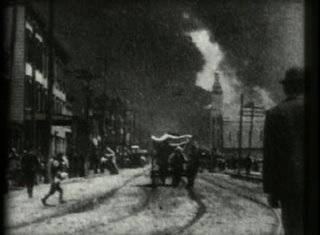
Burning of the Standard Oil Co.’s Tanks, Bayonne, NJ (film #44 on Edison Film Archive). [Category: Early Film & TV]
Scene of a quiet industrial street in Bayonne, with lots of buggies, wagons, and pedestrians, and, oh yes, some smoke in the background, from some burning oil tanks, I guess. This one leaves you scratching your head, but it does give a historically interesting and clear view of an industrial street in 1900. A 1900 Edison film.Ratings: Camp/Humor Value: *. Weirdness: **. Historical Interest: ****. Overall Rating: ***.
For Orphans 3 (film #5 on Open Source Movies). [Category: Hollywood]
This consists of silent footage of a Dutch film premiere and milling-around festival and a guy in a tux announcing the premier of Mr. Deeds Goes to Town in Dutch. Now, I can’t speak Dutch, but it really sounds like he says that the Dutch title of the film is OK, Mr. Deeds. Mostly, though, this is pretty standard, but it does give you some idea of what European movie theater ephemera was like in the 30s.Ratings: Camp/Humor Value: **. Weirdness: ***. Historical Interest: ****. Overall Rating: ***.
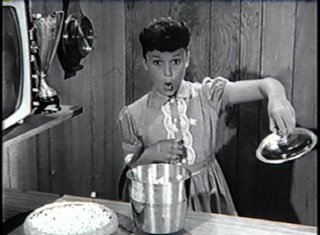
Belair & Raleigh Commercials Compilation #1 (film #160 on UCSF Tobacco Control Archive). [Category: Commerical]
Collection of dorky early-60s commercials for Raleigh and Belair cigarettes. These are not the cool “how do you think I got this neat X?” commercials, but earlier ones that present the Raleigh coupons in an incredibly stilted manner. These are ripe for msting, especially the ones that claim that the smoking suburban couple “lives a good life, enjoying those Raleigh gifts,” including lung cancer, I’m sure. See how easy it is?Ratings: Camp/Humor Value: ****. Weirdness: ***. Historical Interest: *****. Overall Rating: ****.
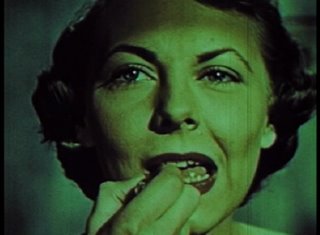
Color Keying in Art and Living (film #349 on Prelinger Archive). [Category: Educational]
This dry educational film about color mixing and combining has some striking imagery, both abstract and concrete, of the outcomes of combining or juxtaposing various colors together. Unfortunately, the print has washed-out color that emphasizes green in everything. This could increase the camp value of the film, but it doesn’t because it’s just too hard to see the colors. Meat fans will enjoy the brief scene of a huge side of beef, and the 50s makeup scenes are appropriately garish, but even then I think they’d be more enjoyable if the colors were more accurate.Ratings: Camp/Humor Value: ***. Weirdness: ****. Historical Interest: ****. Overall Rating: ***.
Break of Day (film #2 in the Rural Settlement and Security section of the State of Israel section of Stephen Spielberg Jewish Film Archive). [Category: Sleaze & Outsider]
This 50s film, like others in the Spielberg Archive, tells the story of a family of rural Israeli settlers in the many pioneer settlements of the period. But whereas most such films are hopeful, this one has a sad, tragic feel to it, though the ending hints at some hope. The father of this family tires of the endless hard work and privations of the settlement, so he moves his family away to a slum village. But life is still very hard, and he must face the disappointment of his young son, who considered the settlement his home. The events leading up to the family’s eventual return to the settlement highlight the difficulties these pioneers faced, whatever choices they made. I suppose it was made to discourage these people from giving up on pioneering, but how effective it was at that is hard to say. It is a well-made and touching film, though, with lots of historical value.Ratings: Camp/Humor Value: *. Weirdness: ***. Historical Interest: *****. Overall Rating: ****.
The First Million (film #16 in the General section of the State of Israel section of Stephen Spielberg Jewish Film Archive). [Category: Public Service]
Israeli film from the 70s, narrated in Spanish, about the importance of educating disadvantaged youth. The foreign-language narration made this hard for me to follow, but it seems to be a fairly standard story about the problems of disadvantaged youth, and how education gives them brighter futures. There’s lots of footage of children, adolescents, and young adults engaging in various pursuits in 70s Israel, if you’re looking for that.Ratings: Camp/Humor Value: *. Weirdness: *. Historical Interest: ***. Overall Rating: **.
The Devilish Tennant (film #11 on Melies the Magician DVD (Facets Video, 2001)). [Category: Early Film & TV]
The Devilish Tennant is Melies himself, who rents an apartment and proceeds to furnish it out of his magic carpetbag, which rivals Felix the Cat's. When the rent comes due, he scares his landlord half to death by making all the furnishings dance, and then while the landlord is cowering downstairs, he folds up and puts away all his furnishings in the bag and skips town. An interrupting policeman is simply folded up inside the piano, which is placed in the bag. This is a delightful little Melies romp, and the hand-colored print is beautiful. A 1909 Melies film.Ratings: Camp/Humor Value: ****. Weirdness: ****. Historical Interest: *****. Overall Rating: ****.
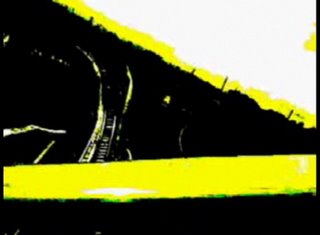
Abstract Coaster Footage #2 (film #260 on Open Source Movies). [Category: Outtakes & Obscurities]
This version starts nostalgically, like before, then interrupts things to add bright computer colors and heavy metal music. I think I like the nostalgic footage better.Ratings: Camp/Humor Value: *. Weirdness: ***. Historical Interest: ***. Overall Rating: **.
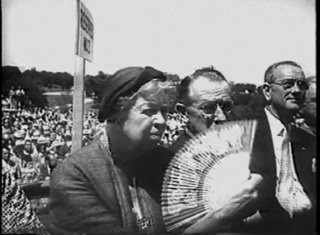
Dedication: Warren, Hoover Hail New Truman Library (film #152 on Universal Newsreels). [Category: News]
Fairly standard newsreel story about the dedication of the Harry S Truman Library. Conspiracy theorists should have fun with the Masonic rituals depicted. Others will find this pretty ordinary.Ratings: Camp/Humor Value: **. Weirdness: **. Historical Interest: ***. Overall Rating: **.
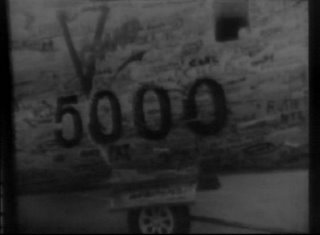
Aviation in the News (film #78 on Universal Newsreels). [Category: Military & Propaganda]
Newsreel clip from WWII showing the 5000th bomber to leave a California aircraft factory, with the signatures of the workers all over it. This is a fun little piece of wartime propaganda. Also included is a story about the emergence of General Tito in Yugoslavia, when he was still considered to be a good guy. Too bad this is one of the newsreels with darkened footage––I would like to be able to see the signed plane better.Ratings: Camp/Humor Value: ***. Weirdness: ***. Historical Interest: ****. Overall Rating: ***.
December 7, 1941 (film #2 on Cinemocracy. Also, film #1 on disc #2 of Pearl Harbor: December 7, 1941 DVD (Madacy Entertainment, 2001)). Also, film #2 of Side A of Disc #10 of War Classics DVD Mega-Pack (TreeLine Films, 2004). Also, film #1 on Side A of Disc #2 of WWII: The Ultimate Collection DVD Boxed Set (Brentwood Home Video, 2004)). [Category: Military & Propaganda]
Directed by John Ford, this retelling of the events of December 7, 1941 is a masterful piece of propaganda, stirring the emotions without straying too far from the truth. The scenes of devastation in the aftermath of the attack are particularly tragic. Surprising is the scene where Ford has several of the slain GIs "speak" to us––the ones he picks are of several different races and ethnic backgrounds. They are all narrated by the same person and the question is asked why they all sound alike. The answer: "We are all Americans." This little piece of tolerance for diversity was way ahead of its time, though it is somewhat offset by the stereotyped "Jap" voice Tojo is given in a later scene. Another amazing sequence is that of the changes made in the civilian lives of Hawaiians in the aftermath of the attack. We see schoolchildren ducking down in foxholes and trying on gas masks, and it reminds us that Hawaii was the one piece of U.S. territory to actually see combat. Most interesting is a sequence where we see Japanese-Americans in Hawaii removing all traces of Japanese culture from their homes and businesses––the most striking being the guy who takes down the sign "Banzai Cafe" and replaces it with "Keep 'Em Flying Cafe" (I want both signs, of course, for the Film Ephemera Museum of Quirky Devices). The ironic thing about this, though, is the fact that Hawaii was the only place in the U.S. where Japanese-Americans were allowed to keep their homes and businesses, rather than be shuffled off to internment camps. One thing that increases the historical interest of this film is the fact that some scenes had portions of the frame blacked out by the censor. This is an essential piece of WWII propaganda.Ratings: Camp/Humor Value: **. Weirdness: ***. Historical Interest: *****+. Overall Rating: *****.
Subscribe to:
Comments (Atom)
Better Reading
Better Reading . Teenager Harold Wilson has a problem—he can’t read for (expletive deleted). So he has to spend all his free time studying ...

-
Better Reading . Teenager Harold Wilson has a problem—he can’t read for (expletive deleted). So he has to spend all his free time studying ...
-
The Best Made Plans. A 50s housewife solves all problems with Saran Wrap plastic film. Of course, all her problems are the kinds we all wa...
-
Annie Oakley – Annie and the First Phone (film #15 in the Classic TV section of Movieflix ). [Category: Early Film & TV] This early-50s ...